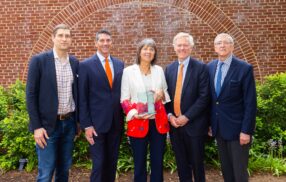
Why Noncompete Agreements Create Such Angst in a Knowledge Economy
By McGregor McCance
The Federal Trade Commission issued a ruling this week that bars companies from implementing noncompete agreements on employees, which prevent them from leaving one job for another with a competitor for certain amounts of time.
The regulation ignited the business world and sparked legal challenges from groups including the U.S. Chamber of Commerce, who argue that noncompete agreements are necessary to protect their intellectual property and the knowledge from being lost to rival companies. The FTC, which narrowly approved the regulation with a 3-2 vote, said noncompetes hamstring workers’ ability to make career advancements and earn better pay.
Lillien Ellis, an assistant professor of leadership and organizations with the University of Virginia Darden School of Business, said that the rapidly growing knowledge economy only raises the stakes in the debate over noncompete agreements and employee mobility. Ellis specializes in the psychology of intellectual property ownership, protection and theft, and the consequences of “idea theft” in contemporary knowledge work.
The Darden Report caught up with Ellis on Thursday for her thoughts about the FTC regulation announcement and the way ahead.
Q. Noncompetes might have started when companies were concerned about losing physical skills to competitors or an employee’s network of sales contacts. How has this evolved?
A. Organizations are concerned that as external mobility increases, employees take with them proprietary information and intellectual property, and other forms of intellectual capital like creative ideas. Much of this is intangible, and employees may not even intend to “take it with them.” It’s not like putting a Rolodex in your briefcase; information and ideas live in the mind. They inspire and influence us. This introduces a kind of innovation cross-pollination effect that has a greater impact on organizations now than it may have in the past. Creative, cutting-edge ideas are how organizations remain competitive. And so, attracting and retaining talented knowledge workers is most certainly top of mind.
Q. Does this make employees more protective of their ideas at work?
A. Research shows that when employees feel a sense of ownership over the work that they do, they work harder, smarter and with an attitude that inspires others to do the same. Given how powerful this sense of ownership is, it can backfire if organizations fail to navigate it strategically. If I come up with an idea — a business process, strategy, product or solution — I might work overtime for months to see it through. It becomes part of my life story, my identity. If my company takes action that seemingly invalidates my sense of ownership, and all that’s tied to it, the data says there are consequences.
Q. The FTC regulation could create new divisions between employees and companies. Do they both have legitimate concerns?
A. Upon leaving an organization, being restricted in what an employee can take with them in terms of creativity, ideas and expertise — that becomes very personal. At the same time, companies are also comprised of people who have invested a lot and feel a strong sense of ownership in the resources they’ve poured into the people who work for them. They similarly feel a sense of pride and ownership. When an employee leaves, there can be a perceived threat of loss on both sides, which can lead to conflict.
Q. If the FTC regulation ultimately is put into place, the underlying issue won’t go away, will it?
A. Leaders will need to find new ways to create a shared understanding with the people they lead. They need to have those conversations directly. They need new mechanisms for helping people understand what it means to own information and ideas, and the company’s position on what can or cannot be owned by individual employees. They need to gain buy-in. By building this shared understanding, employees can approach their work with a clear understanding of where the output of their efforts “belongs” should they choose to move forward in their career at a new company.
Employee mobility is high. This is the status quo. And so, leaders will need to address the mobility of ideas and information as employees come and go. Addressing this requires direct, yet sensitive conversations to build consensus.
Q. What are some of potential side effects of this ongoing debate, especially if it creates acrimony between employees and their employers?
A. People have strong psychological bonds with their work output and ideas — our professional lives and personal lives are intertwined like never before. Employees have a sense of ownership that exists outside the scope of law, and it carries its own consequences if it’s violated.
For example, an individual might speak poorly of the company on social media or through professional networking platforms, sharing negative experiences or criticizing their previous employer. They might share their grievances within their professional circles, potentially influencing others’ perceptions of the company and discouraging potential applicants. They may avoid future employment with that company.
Another concern is idea-hoarding or idea-hiding. If employees believe they lose ownership of their ideas the moment they share them at work, they may choose to withhold them. I’ve spoken with many knowledge workers who say they don’t bother sharing their ideas at work if they know they won’t get credit or have them recognized — that’s a huge problem. That doesn’t mean employers have to say, “OK, fine, then you own everything.” But it does draw attention to the reality organizational leaders face as the knowledge economy grows and regulations around talent management change. It creates an opportunity for organizational leaders to better understand why employees feel ownership, whether and where misalignment exists, and how leaders and employees can navigate this together and productively. It’s messy and takes work.
The University of Virginia Darden School of Business prepares responsible global leaders through unparalleled transformational learning experiences. Darden’s graduate degree programs (MBA, MSBA and Ph.D.) and Executive Education & Lifelong Learning programs offered by the Darden School Foundation set the stage for a lifetime of career advancement and impact. Darden’s top-ranked faculty, renowned for teaching excellence, inspires and shapes modern business leadership worldwide through research, thought leadership and business publishing. Darden has Grounds in Charlottesville, Virginia, and the Washington, D.C., area and a global community that includes 18,000 alumni in 90 countries. Darden was established in 1955 at the University of Virginia, a top public university founded by Thomas Jefferson in 1819 in Charlottesville, Virginia.
Press Contact
Molly Mitchell
Associate Director of Content Marketing and Social Media
Darden School of Business
University of Virginia
MitchellM@darden.virginia.edu





